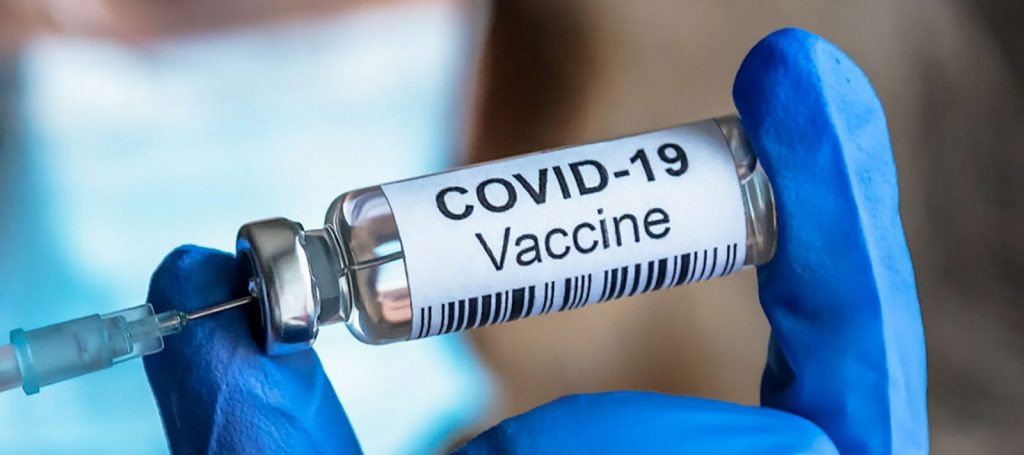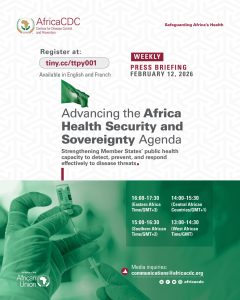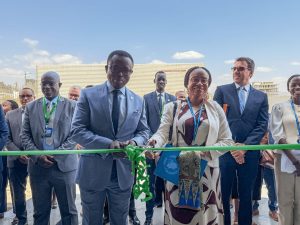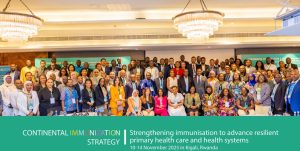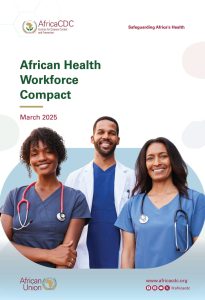A newly released analysis finds that scale-up speed, a focus on at-risk populations and the choice of COVID-19 vaccine brands are critical to structuring successful programs in the African context.
Addis Ababa, Ethiopia: The Africa Centres for Disease Control and Prevention today released the results of a new 27-country analysis on the health and economic impact of COVID-19 vaccination. The retrospective study on the roll-out of COVID-19 vaccine programmes demonstrated that earlier start dates and rapid scale-up delivered greater health benefits – measured in terms of hospitalizations and deaths averted – and were more cost-effective when compared with programs that started later and scaled more slowly. Furthermore, the benefits of COVID-19 vaccines vary widely depending on the pace of roll-out, the population targeted, and the type of vaccines used in the campaigns. The analysis also drew on research from Kenya, Nigeria, Ethiopia and South Africa.
The analysis demonstrated that vaccine programs deliver the best value for money when focused on the most vulnerable, including the elderly, pregnant women, health workers and those with comorbidities. This is especially true in countries with a low overall risk of severe outcomes from COVID-19, such as nations with younger populations or that have already had significant exposure to the virus. In Kenya, researchers found that scaling up to 30% of the population, but focusing on the elderly, was far more effective than reaching 70% coverage of the general population. Nigerian researchers found the same result when modelling targeted scale-up to 25% of the population.
“The evidence is clear – countries should aim to vaccinate those most at risk, as quickly as possible, with the most cost-effective vaccines available to them,” said Dr. Ahmed Ogwell Ouma, Deputy Director of the Africa CDC. “This is how we can save the most lives and deliver the highest value for money.”
The research found that it is not only the overall vaccine coverage reached that determines the benefits of a vaccine program. Rather, starting early and moving quickly are critical levers to increase the impact of any COVID-19 vaccine program. In South Africa, a 40% vaccine coverage achieved through a fast roll-out was found to provide greater health benefits over a year than 67% coverage attained slowly. For countries where large numbers of the population remain unvaccinated, moving with urgency and scaling-up quickly is critical. The study also found COVID-19 vaccine efforts become less cost-effective – or not cost-effective at all – as countries take longer to scale their programs.
“This new research gives us a clear direction of travel,” said Prof Edwine Barasa, Director at the Nairobi Programme of the KEMRI-Wellcome Trust Research Programme. “Many countries are struggling to scale – but if we can move faster and in a more targeted way, we can get the job done.”
There have been 11.5 million confirmed cases of COVID-19 in Africa, with more than a quarter million lives lost. While scale-up of vaccine programs continues apace and more than 20% of Africans have now received one dose of a COVID-19 vaccine, this masks wide disparities across the continent. Several African countries have nearly vaccinated 70% of their populations with two doses; while others have not yet reached 1% of their populations with the first dose.
The study also explored how the choice of vaccines impacts the cost-effectiveness of vaccine programs across the continent. While the efficacy of COVID-19 vaccines does not vary significantly across products, mRNA vaccines tend to have significantly higher procurement and delivery costs. Choosing the least expensive vaccine options, especially in the case of budgetary limitations, is a pragmatic way to improve the cost-effectiveness of COVID-19 vaccine programs.
“There is no doubt that COVID vaccines remain cost-effective under a number of scenarios,” said Dr. Justice Nonvignon, Ag. Head of the Africa CDC Health Economics Programme. “But it is equally clear that as the pandemic evolves, we need to be thoughtful about how we spend our time and money. In certain contexts, African countries may deliver greater health benefits to their citizens by investing in other more cost-effective health programs.”
Cost-effectiveness studies weigh the benefits of a health program compared to its costs. This analysis included a detailed range of COVID-related costs. To measure the cost of COVID-19 vaccine programs, researchers studied the cost of the vaccines themselves as well as associated delivery costs for campaigns. To measure the costs of COVID-19, the study explored impacts on disability adjusted life years (DALYs), a widely used measure for health benefits that includes years of life lost due to COVID-19 and years lived with disability for symptomatic cases, hospital stays in a general or critical bed, including long COVID.
The analysis was conducted by a broad coalition of local and international research groups. The Kenya Medical Research Institute – Wellcome Trust, University of Nigeria; Ethiopian Public Health Institute and the University of Warwick all contributed to the country-specific case studies; while the London School of Hygiene and Tropical Medicine prepared the regional analysis, with inputs from the Center for Global Development and the international Decision Support Initiative (iDSI). The Africa CDC oversaw the studies.
Link to full report: https://africacdc.org/download/epidemiological-and-economic-impact-of-covid-19-vaccine-rollout-scenarios-in-africa/
[END]
# # #
Media contacts
Nekerwon Gweh
Communication & Media Engagement, Africa CDC
GwehN@africa-union.org
Dr. Chrys P. Kaniki
Media Engagement, Africa CDC
KanikiC@africa-union.org
Ouma Onyango
Senior Program Associate, Global Health Strategies
oonyango@globalhealthstrategies.com
About Africa CDC
Africa CDC is a specialized technical institution of the African Union which supports Member States in their efforts to strengthen health systems and improve surveillance, emergency response, prevention and control of diseases. Learn more at: https://africacdc.org — END —

